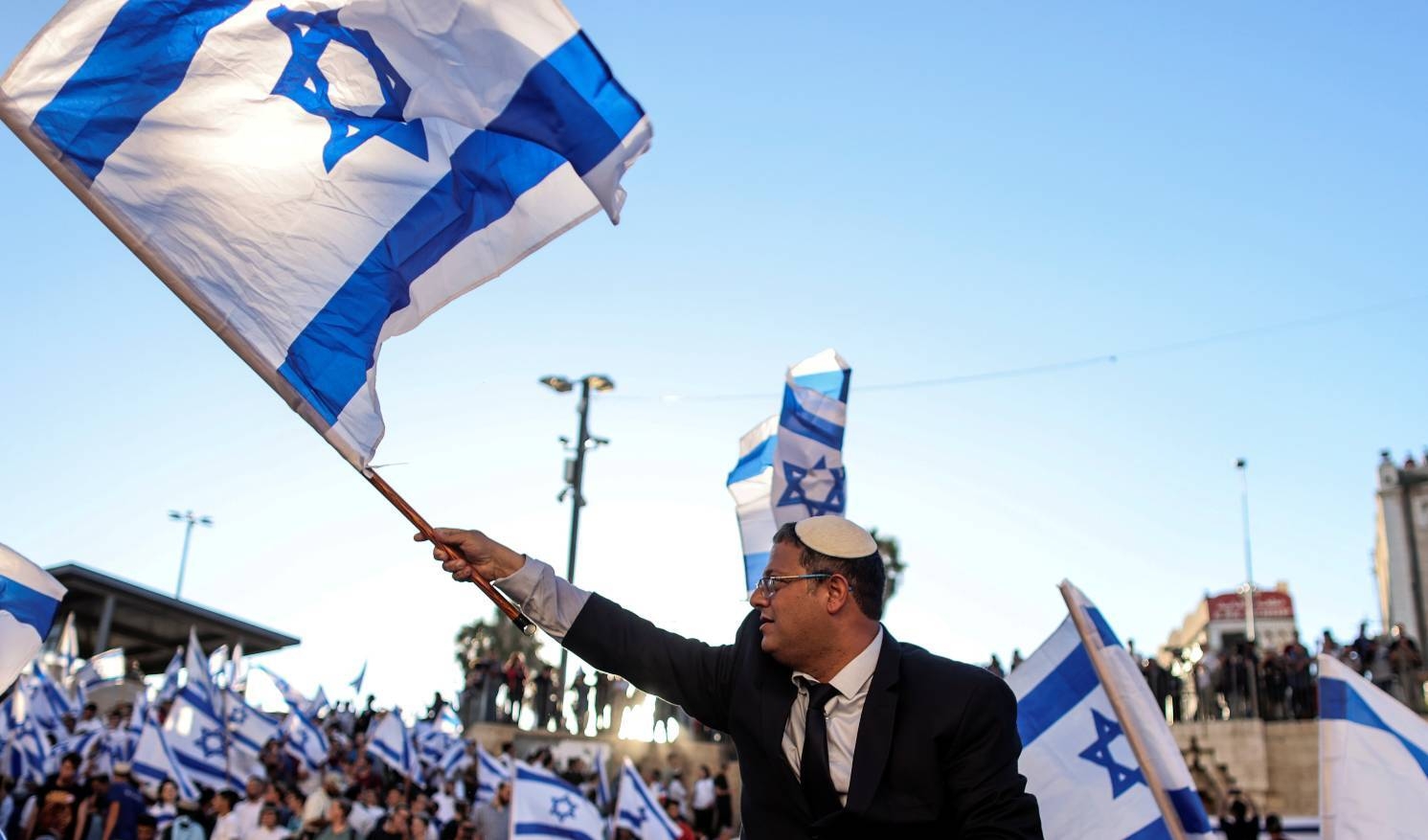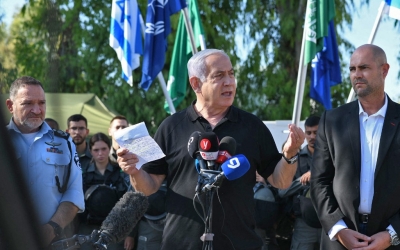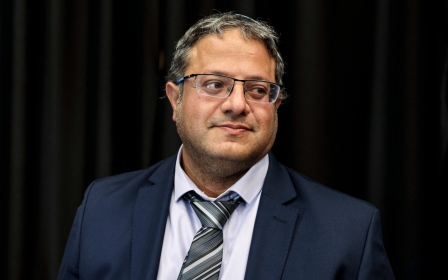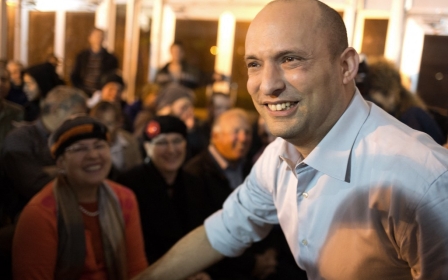Itamar Ben-Gvir: With rise of a Jewish supremacist, Israel's Likud is pulled far-right

For many years, Itamar Ben-Gvir was a political outcast in Israel. He was educated in Rabbi Meir Kahana’s Kach party with its official platform advocating the nullification of Israeli citizenship for the state’s Palestinian citizens.
Kach was such a racist party that members of Likud, then the leading right-wing party, would walk out of the Knesset plenum whenever Kahana spoke from the podium.
After Kach - the only Jewish political entity in Israel ever defined as a terrorist organisation - was outlawed, Ben-Gvir continued his violent activism against Palestinians and was charged eight times for it, including for incitement to racism and support for a terrorist organisation.
For many years, he hung at his home a portrait of Baruch Goldstein, the settler from Kiryat Arba who in 1994 murdered 29 Muslim worshippers in Hebron’s Ibrahimi Mosque (Jews call it the Cave of the Patriarchs).
For nearly a decade, Ben-Gvir kept trying to enter Israel’s parliament on an independent party list called “Jewish Power" (Otzma Yehudit), but he never made it past the 3.25 percent threshold required to claim a seat. Then came the most recent Israeli national elections.
As the date approached, Benjamin Netanyahu, fearful of losing votes to his right, pressured the right-wing Religious Zionism party to merge its list with Jewish Power.
This move finally enabled Ben-Gvir, identified more than any other political figure in Israel with violent racism towards Palestinians, to take a seat in the Knesset in March.
Ben-Gvirism goes mainstream
Earlier this month, Ben-Gvir was one of several prominent speakers at a demonstration by rightist parties at Habima Plaza in Tel Aviv. It was his first public appearance alongside leaders from Likud, Netanyahu’s party, but it didn't feel like it. His speech could be described as the highlight of the evening or, at any rate, the most significant one made at the event.
Before he spoke, the gathering was treated to a lengthy video showing Ben-Gvir on the Knesset podium arguing with fellow MK Mansour Abbas, chair of the Islamic Party in the ruling coalition headed by Naftali Bennett and the first Arab party in Israel ever to be part of the government. Along with Bennett himself, Abbas was the figure most hated by the demonstrators at Habima Plaza.
In the video, Ben-Gvir demanded that Abbas denounce Palestinians who threw stones near the Al Aqsa Mosque while Abbas, in the same video, blamed Ben-Gvir for stoking incitement in Jerusalem. Screening that accusation to the audience that night - blaming Ben-Gvir for the incitement raging in Jerusalem - was evidently meant to give him additional points with his base.
“Itamar Ben-Gvir, the man and the legend, fighting for democracy,” is how the event’s moderator introduced him, emphasising his position as leader of the Jewish Power party. “Note those words, ‘Jewish Power,’” she said, evoking loud chants from the audience of “Ben-Gvir! Ben-Gvir!”
But the most interesting thing was not the fact that Ben-Gvir, former political outcast once shunned by Likud and the right-wing establishment, was received with obvious enthusiasm by some 2,000 demonstrators at Habima Plaza. More interesting was the content of his speech. He did not talk about a Greater Israel, or settling the land, or the danger posed by a Palestinian state or even Iran. Instead, Ben-Gvir talked about what might be termed “the enemy from within”: Arabs (Palestinian) citizens of Israel and the threat they pose to the Jewish identity of the state.
'The only one telling the truth'
“I travel around the country a lot,” Ben-Gvir told the audience. “In Beersheba, a woman told me that she is afraid to go to the mall because she is harassed there [by Arabs]. Farmers in the Galilee tell me they are asking for protection [from Arabs]. A mother in Ramle told me that her son takes off his skullcap when he leaves school because he is afraid that Arab children will beat him up.”
Fascinated, the audience hung on his every word. “He’s the only one telling the truth,” someone behind me said.
'I told him that you are not ‘Sir’ to me. In Syria, you can be ‘Sir''
- MK Itamar Ben-Gvir to MK Ahmad Tibi
“They [the Arabs] are standing tall,” Ben-Gvir said, mentioning a confrontation he had with fellow MK Ahmad Tibi when the latter asked Ben-Gvir to address him according to protocol as “Sir”.
“I told him that you are not ‘Sir’ to me; in Syria you can be ‘Sir,’” Ben-Gvir related.
Ben-Gvir’s discourse fits smoothly with that of nearly all the other speakers. All agreed that the real danger threatening Israel, no less and perhaps more than that posed by Bennett and Abbas, is “a state of all its citizens,” a term coined by Palestinian leader Azmi Bishara in the 1990s as an attempt to challenge the concept of “the Jewish state”.
This threat, the speakers agreed, comes from everywhere. Not just from the Palestinian minority in Israel, but also from secularism. Before Shlomo Karhi, a religious MK from Likud, began his speech, another video was shown, this one titled unequivocally Israel Is Committing Suicide.
Alongside the support for “terrorist sympathisers” from the Islamic Party, the video mentioned Transportation Minister Merav Michaeli, chair of the Labor Party, and her support for public transportation on the Sabbath and the presence of Reform Jews praying at the Western Wall.
“They are trying to damage [our] Jewish identity, to harm the living God, to raise up the slaves," Karhi declared, referring to Arabs and commenting on the video. Our parents, he said, came here “seeking Judaism and got Reform Jews, seeking Israel and got Ishmael… We did not come here for a state of all its citizens and all its terrorists".
MK Galit Distel Atbaryan, who was nominated for the Likud list personally by Netanyahu and also spoke at the event, tried to depict this struggle as having an almost transcendental religious significance.
“I see a pillar of light rising from this place to the heavens,” she said. “You are the pillar of fire, you are the link with King David and [Ze’ev] Jabotinsky [the historical leader of the Zionist right-wing]. You are the wall stretching from Sinai to this public square to preclude a state of all its citizens… The One sitting on high sees how the Jewish state is slipping away through our fingers to the benefit of Hamas and the megalomaniac liar Bennett.”
Nearly all the speakers mentioned Netanyahu to applause. They all spoke about the disastrous coalition with Abbas and the “budgetary funding” that the Islamic Movement is supposedly channelling to Hamas, after an investigative report on Israel Channel 13 showed the leader of the Islamic Movement in Israel alongside a Hamas leader in Gaza.
But that did not seem to be the main point. The main point was to formulate what one might call “the front to save the Jewish state”. Everything else seemed marginal.
No-one talked about “extending sovereignty” - the previous term for annexing the West Bank, the flagship project of the Israeli right for the last decade, or about a “Greater Israel”. Karhi was the only speaker who bothered to warn about a “Palestinian state”.
As in the Jewish centre-left, the Palestinian issue has also dropped off the right-wing agenda, and what’s left is the threat from within, the home front.
Open season for Jewish supremacy
What happened at the 2 November event in that plaza seems almost like the political crystallisation of a “Jewish supremacy” movement. It is about preserving the exclusivity of having Jewish ethnic identity at the helm of government, with Jewish privilege portrayed as the supreme goal, the common denominator for the entire rightist camp.
This approach has, of course, been there in Zionism and the state of Israel from the outset. Now, however, it has been openly declared and explicitly celebrated, a banner uniting all parts of the right-wing – Likud, ultra-Orthodox, the rightist settler movement.
The unembarrassed talk of Arabs who dare to stand tall, of Jews threatened in their own cities and towns, of Reform Jews gnawing away at the identity of the state, of the need to strengthen Jewish education in the secular school system – all of that is part of the same approach that centres the internal front as the main front, the threat from within as the main enemy.
When that is the approach, one can understand why Ben-Gvir fits hand-in-glove with this new rightist movement.
Likud has undergone a Ben-Gvirisation, rather than the other way round. He’s been selling these goods for years now: racism and Jewish supremacy, seasoned as it were with religious idioms.
In this rightist movement, there is no longer room for a Republican right on the traditional American model as the Likud portrayed itself for years, just as there is no place for the “old” Republicans with Donald Trump.
If this new right wing takes back the government - which is certainly a possibility - Ben-Gvir and Ben-Gvirism will have a key role. This is worrisome, even frightening. But at the same time, the crystallisation of the right around Jewish supremacy, openly declared, could also create a reaction.
Push for partnership?
We have yet to see what the long-term impact will be of having Abbas sit in this government alongside Bennett, the former head of the Judea and Samaria Regional Council, who still proclaims himself a rightist.
It may be that, despite all the reservations about this alliance, it will push parts of the Jewish public into the actual practice of political partnership with the Arab public that could later segue into an ideology.
'We did not come here for a state of all its citizens and all its terrorists'
- Shlomo Karhi MK
The 2 November demonstration showed that the right in Israel has begun to emerge from the shock of losing the reins of government under Netanyahu.
The crowd in the plaza wasn’t all that large, but it was larger than what the right has managed to bring to the public square over the last two years, and the speakers had a notably strong connection with their audience. A certain unity of purpose seems to have been established.
The only response to the solidification of this Jewish supremacy camp is a solidification of a movement towards a Jewish-Palestinian political partnership. Such a movement, however, does not yet exist.
There is potential. There have perhaps been the first stirrings, but it has yet to be formulated as a political movement with a clear thesis and clear shared values. But this push from the right may prove to be - or at least ought to be - of some help in energising more movement towards a partnership.
This article is available in French on Middle East Eye French edition.
Middle East Eye propose une couverture et une analyse indépendantes et incomparables du Moyen-Orient, de l’Afrique du Nord et d’autres régions du monde. Pour en savoir plus sur la reprise de ce contenu et les frais qui s’appliquent, veuillez remplir ce formulaire [en anglais]. Pour en savoir plus sur MEE, cliquez ici [en anglais].





